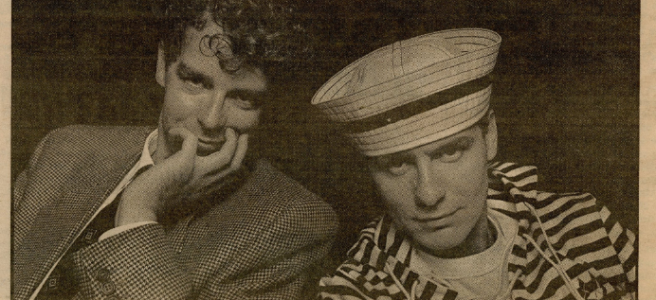Snippets from Chuck Eddy’s Village Voice review of Introspective (“18 Shopping Days Left,” December 13, 1988), which I’ll hopefully comment on later (feel free to jump in yourself). My only general comment is that the review is not as over-the-top about PSB as I half-remembered it being. In fact, it skews somewhat in the other direction: Chuck seems unconvinced by (and skeptical of) PSB overall — they pale next to his beloved Exposé, who are cited three or four times here — though in the end he can’t resist the “confusedly jubilant” pleasures of what he admits is “the best Pet Shop album.”
(Semi-interesting sidenotes: 1. Below Chuck’s review is Vince Aletti’s “Single Life” column, a rundown mostly of the acid-house hits then storming the UK, but with a few choice — and very complimentary — words about Introspective also, i.e., “six songs that ransack dance idioms from Brooklyn to Chicago with affection and wit.” 2. The second review after Chuck’s is Frank Owen’s review of the Pop Tarts, cheekily headlined, “Shopping in America.” Who remembers the Pop Tarts? No one? Thought so. I recall them being a kind of similar-to-PSB critical big deal post-something-or-other at the time, but nothing I read about them actually convinced me to listen to them. To this day, I’ve still not heard a note of their music, I don’t think.)
“Introspective‘s got the first two Pet Shop cover versions, both of which apparently make fun of the originals; Tennant recites most of ‘Always on My Mind’ as if Elvis/Willie’s longing and regret were impossible, reads Sterling Void’s ludicrous acid-protest ‘It’s Alright’ almost as blandly. After 15-plus post-Bowie years of music-about-musicmaking, contemptuous theatricality like this ain’t so much subversive as just too fuckin easy.
“But so’s this analysis. Unless you’re of Exposé’s ingenuous ilk to say in the post-Bruce age that you’re posing is only to say you make no conscious stab at the intentional-honesty lie. Soul-sincerity’s as phony as phoniness by now, and distance-from-material encompasses all suckup-to-rockcrit crud from Los Lobos to Mudhoney. British whiteboys singing like British whiteboys beat British whiteboys singing like black men; ditto for products admitting they’re products.”
“And nobody knows products like these consumers of oligopological output in the dead-end world where everything’s for sale and money talks and streets are gold, these un-Iggylike pet-shoppers who’d rather buy a dog than be one. We’re all prostitues, shopping for someone to pet, so romance equals commerce: ‘I love you/You pay my rent,’ ‘You always wanted a lover/I only wanted a job.’ Introspective argues we’re taught competition as babes, eventually left not to our own devices but choiceless. The denial of self-determination stupidly distorts reality, but then again when I first heard ‘West End Girls’ three years ago I was ‘sold’ right away ’cause (just like ‘All the Young Dudes’) the first two lines suggest young people should blow their brains out. The cashier took my money.”
“Theoretically, these Boys negate my entire worldview. Not because they’re wimps (I identify with their wimpdom — they could probably kick my ass, actually), but because their ironic distance adds nothing, ever. Tennant’s toasty tongue-texture and minimalist language are fine, but too often he’s content to let us know he’s performing — he walks too fast and talks too slow, too constricted and stylized and arid, ‘conversational’ only if people who read books while you’re talking to ’em over the phone don’t make you nervous.”
“When the Pet Shop Boys succeed, they succeed despite themselves. Tennant’s monotone usually communicates more when it’s singing than when it’s rapping; in parts of ‘It’s a Sin,’ ‘What Have I Done to Deserve This?’ (where at first he’s as passionate as his duet partner Dusty Springfield), and ‘Rent,’ something’s at stake. I was raised Catholic and I’m a househusband and Bee Gees fan, so lines hit me here and there. The masses take ‘Always on My Mind’ and ‘What Have I’ at face value (a la ‘Born in the U.S.A.,’ ‘Sweet Dreams Are Made of This’) because face value is the only way these songs could possibly matter.”
“If the Boys are still more ‘about disco’ than ‘are disco,’ well, Poison’s more ‘about rock’n’roll’ than ‘are rock’n’roll’ (‘Your Mama Don’t Dance’ might be a joke too, y’know), and Introspective‘s confusedly jubilant enough to earn the comparison. These sly devils are a (plastic) pop group, not some late-capitalist zeitgeist. But sometimes they’re even funnier than the real thing.”
“Yet I’m left breathless by the hog-stomping Baroque disco-grandeur (shades of Alec Constandino’s Hunchback of Notre Dame) that opens Introspective, a Shopping Channel sellout that’s the best Pet Shop album for the same reason ‘West End Girls’ is their best single: most gleeful hooks, most persistent throb, most flamin maneuvers, most evocatively dopey writing, least cynical bullshit. The groove’s more sensuous, finally closer to Exposé than Erasure.”























